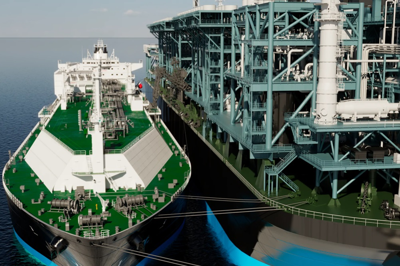
An artist’s conception shows the offloading of liquefied natural gas from the proposed Delfin LNG facility.
NEW ORLEANS – Three environmental groups are challenging the Trump administration over its recent approval of a proposed liquefied natural gas export terminal off Louisiana’s coast that the groups say poses risks to the marine ecosystem.
The petition from the Center for Biological Diversity, Sierra Club and Habitat Recovery Project was filed May 19 in the Fifth Circuit Court of Appeals. It seeks a review of the decision by the U.S. Department of Transportation’s Maritime Administration to greenlight Delfin LNG’s plans to build the LNG export facility 40 miles off the state’s coastline.
Delfin LNG plans to use the deepwater facility to transport LNG to the global market from federal waters off of Cameron Parish, according to a news release from the Maritime Administration.
“The Delfin LNG LLC deepwater port license is being issued in accordance with President Trump’s executive order titled, ‘Unleashing American Energy,’ signed Jan. 20 …” the Maritime Administration reported. “This deepwater port project will be the first offshore LNG export project in the United States.”
The licensing was coordinated with 15 federal agencies as well as the U.S. Coast Guard and state regulators in Louisiana and Texas, the news release states.
But exhibits accompanying the petition filed in the Fifth Circuit point out that a year ago, the same agency rejected the licensing of the LNG project due to changes in design, ownership and financing that had been made since the facility won initial approval in 2017.
Last year, the Biden administration pointed out that the proposal calls for third-party ownership and operation of the project’s four floating liquefied natural gas vessels, or FLNGVs. But the original proposal said Delfin would own and operate the FLNGVs, an April 17, 2024, letter from former Maritime Administration associate administrator William Paape states.
The latest LNG proposal also contains design changes to the anchoring system, power generation components and cooling systems, according to the letter. In addition, certain companies originally involved in the financing of the project appear to no longer be actively involved, Paape said.
“It’s outrageous that the Trump administration fast-tracked this project with no review of serious environmental risks,” Lauren Parker, an attorney at the Center for Biological Diversity’s Climate Law Institute, said. “Nothing about this project is in the public interest, from increases in consumer costs to public health harms. We’re in an affordability crisis, a climate crisis and an extinction crisis and this project will make all three worse.”
Parker indicated that exporting American resources can also put upward pressure on energy prices for U.S. consumers and ratepayers.
“LNG exports increase energy prices for U.S. consumers,” Parker told the Louisiana Record in an email. “Even worse, these cost increases hurt the communities most burdened by the pollution of these same facilities. Exports harm the public for the benefit of a few fossil fuel executives.”
The environmental groups challenging the LNG facility also warn that the Rice’s whale, which was discovered since an initial approval was granted to Delfin in 2017, could be endangered by the facility and the massive LNG tankers that would be serviced there.
The Habitat Recovery Project has also expressed concern about the facility’s impact on Gulf fisheries, where catches have dwindled in recent years.
“Our organization stands with the fishermen of Cameron Parish, whose livelihoods, culture and waters are being sacrificed without consent,” Alyssa Portaro, director of the Habitat Recovery Project, said in a prepared statement. “... The approval of Delfin LNG, without a single public hearing or updated environmental review, is not just a legal failure – it’s a moral one. Habitat Recovery Project will continue working alongside the fisherfolk to hold decision-makers accountable and protect the Gulf for generations to come.”




